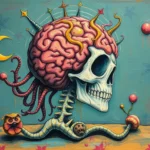
Have you ever woken up in a cold sweat, your heart racing, after dreaming about a tragic event? Perhaps you witnessed a disaster unfold, lost someone dear, or found yourself caught in an emotional storm. These dreams can leave a lingering sense of unease, prompting you to question their meaning and significance. You’re not alone—many people find themselves grappling with the emotional weight of such dreams, wondering if they’re mere echoes of our fears or deeper reflections of our inner turmoil.
In this exploration of dreams about tragic events, we’ll delve into the rich symbolism these dreams carry, examine relatable scenarios that might resonate with your experiences, and uncover how these dreams can serve as catalysts for personal growth. So, grab a cozy blanket and let’s navigate the intricate world of your subconscious together.
The Shadows of the Mind: Understanding Symbolism in Tragic Dreams
When we dream of tragic events, our subconscious often communicates through rich symbolism. Each element in your dream can represent various aspects of your waking life. For instance, if you dream about a natural disaster, like an earthquake or tsunami, it may symbolize feelings of instability or a fear of losing control. Such dreams can reflect the chaos you might be experiencing in your day-to-day life, whether it’s work-related stress, personal relationships, or existential anxieties.
Loss is another powerful symbol in dreams of tragedy. Dreaming about losing a loved one can evoke intense emotions, but it doesn’t necessarily predict an actual loss. Instead, it often highlights feelings of vulnerability and the inherent fear of change. This can be particularly poignant if you’re going through a significant transition, such as starting a new job or moving to a different city. Your mind might be processing the inevitable changes that come with growth, which can feel both exciting and frightening.
Conflict is also a common theme in tragic dreams. If you find yourself in a dream where you are involved in a heated argument or witnessing violence, it may indicate unresolved tensions in your life. This could be a reflection of your own inner struggles or conflicts with others. The dream serves as a reminder to address these issues instead of allowing them to fester beneath the surface.
Another intriguing symbol is the environment in your dream. The setting can provide significant insights into your emotional state. For instance, a dark, stormy landscape may evoke feelings of hopelessness, while a familiar place turned chaotic could signify a disruption in your sense of security. By analyzing the surroundings in your dream, you can gain a clearer understanding of your emotional landscape.
Finally, emotional reactions during the dream play a crucial role. If you wake up feeling anxious, sorrowful, or even relieved, these emotions can guide you towards understanding what aspects of your life need attention. Acknowledging these feelings can lead to greater self-awareness and healing.
From Nightmares to Narratives: Relatable Scenarios of Tragedy
Now that we’ve explored the symbolism behind tragic dreams, let’s examine some relatable scenarios that many people experience. Each of these narratives can bring you closer to understanding the messages your dreams are conveying.
1. The Sudden Accident
Imagine dreaming of a sudden car accident where you’re either the driver or a passenger. This scenario may reflect feelings of loss of control in your life. Perhaps you’re embarking on a new project or relationship that feels risky. This dream can serve as a cautionary tale, urging you to slow down and evaluate your choices before proceeding.
2. The Disappearance of a Loved One
In another common dream, you may find yourself searching for a loved one who has inexplicably vanished. This can represent your fears of abandonment or feelings of insecurity in your relationships. It might be a signal to connect with those you care about, reinforcing your bonds and addressing any underlying tensions.
3. Witnessing a Natural Disaster
Dreaming of witnessing a natural disaster—like a flood or fire—can symbolize emotional upheaval. This scenario often arises during periods of stress or anxiety. Your subconscious may be urging you to confront these overwhelming emotions and seek ways to restore balance in your life.
4. Being Trapped in a Crisis
If you dream of being trapped in a crisis, such as an active shooter situation or a major catastrophe, this can reflect feelings of helplessness. It may indicate that you feel overwhelmed by external pressures or are struggling to cope with a situation that seems beyond your control. This dream invites you to explore your coping mechanisms and reevaluate your approach to challenges.
5. Reliving a Trauma
Sometimes, dreams may bring forth memories of past traumas, where you relive a tragic event. This can be emotionally intense, but it may also signify a process of healing. Your subconscious is working through unresolved feelings, encouraging you to confront and process these experiences to facilitate emotional healing.
Embracing the Storm: Transformative Insights for Personal Growth
While dreams about tragic events can be unsettling, they often carry profound messages that can guide us toward personal growth. Here are some insights on how to embrace these dreams and use them as vehicles for transformation.
Acknowledge Your Feelings
The first step toward understanding your dreams is to acknowledge your feelings. When you wake up from a tragic dream, take a moment to reflect on how it made you feel. Whether it’s fear, sadness, or relief, recognizing these emotions can provide valuable insights into your waking life. Journaling about your dreams can also help you process your feelings and uncover patterns in your emotional responses.
Seek Connections
Next, consider the connections between your dreams and your waking life. What real-life situations or relationships could be influencing your subconscious mind? Engaging in open conversations with trusted friends or family members can provide clarity and support as you navigate your feelings. Sometimes, sharing your dreams can reveal insights you hadn’t considered before.
Embrace Change
Dreams of tragedy often signal impending change or the need for transformation. Rather than resisting change, embrace it. Reflect on what aspects of your life may be calling for renewal or realignment. This may involve letting go of unhealthy relationships, altering your career path, or even changing your daily routines. Embracing change can lead to personal growth and a renewed sense of purpose.
Practice Mindfulness
Incorporating mindfulness techniques into your daily routine can help ground you amidst emotional turbulence. Meditation, deep breathing exercises, or simply spending time in nature can create a calming effect, allowing you to process your feelings and reduce anxiety. By cultivating mindfulness, you can build resilience and better navigate the challenges life throws your way.
Seek Professional Guidance
If your dreams about tragedy become overwhelming or interfere with your daily life, consider seeking professional guidance. A therapist or counselor can help you explore the underlying issues these dreams may represent. They can provide tools and strategies to work through your emotions, fostering a sense of healing and clarity.
As we navigate through life, our dreams often serve as mirrors reflecting our innermost fears, hopes, and desires. Tragic dreams, while unsettling, can be powerful teachers, guiding us toward self-discovery and personal growth. The next time you find yourself waking from a nightmare, take a moment to reflect on its symbolism and the messages it may hold. By embracing these dreams, you can unlock the door to greater understanding and transformation in your waking life.
In the end, remember this: every storm has its purpose. Your dreams, even the tragic ones, are part of your journey—a journey toward healing, understanding, and ultimately, growth. Embrace the lessons they offer, and let them guide you toward a brighter, more empowered self.







